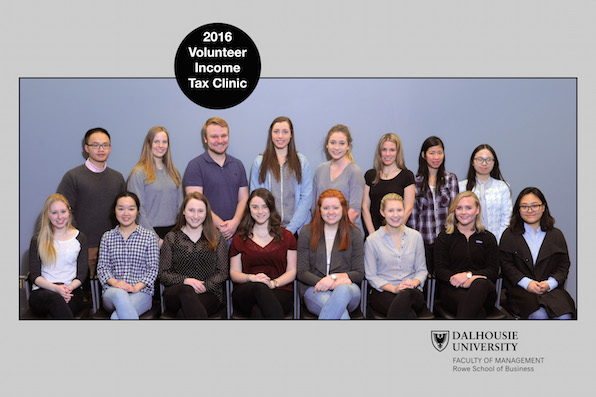News
» Go to news mainFiled away: Students help with tax returns

It’s the time of year for taxes. While most groan over completing their returns, a group of Dalhousie accounting students have turned their attention to completing not only their own tax returns but also those of many others.
The Canada Revenue Agency has similar clinics across the country and, in 2013, Laura Cumming, an accounting lecturer in the Rowe School of Business, began the program at Dalhousie. Each year, a group of students—mostly third- and fourth-year accounting majors—volunteer their time over the course of a few evenings in March to help others prepare their returns. This year, about 20 students participated. Most of their “clients” were students, but the clinic always focuses on helping the larger community. The students completed about 12 returns for residents of Adsum House, a shelter for women and children. “Even though they weren’t physically able to come in we could still help them,” says Melissa Logan, a third-year student. “It was nice to be able to help people who might not otherwise be able to file a return.”
Logan and Molly MacDonald, also in third year, coordinated this year’s tax clinic. Logan managed the internal aspect, coordinating the volunteers, while Macdonald handled the external side of the project, liaising with clients. “A lot of people don’t know what they need to bring, what they could get back,” says Macdonald. “They don’t know a whole lot about the CRA in general. It was interesting to say ‘have you worked this year, then you need a T4’ etc., and have them respond.” Logan had never coordinated a volunteer activity before, and greatly appreciated the other students. “Everyone was very conscientious,” she says. “They were really nervous about filing taxes, saying ‘what if I do it wrong?’ So on Molly’s side it was like ‘I don’t know what to bring’ and on my side it was like ‘Am I even allowed to do this?’”
The volunteers got over their apprehension, though, completing about 80 tax returns for students and community members. “I was impressed, as always, with the generosity and abilities of the students,” noted Cumming.
Erin Graves was one of only two first-year students to ever volunteer for the clinic. (The other was Logan.) Graves learned about the clinic from Cumming, who taught her in her first term. “I told Prof. Cumming that I quit my job to focus on school and volunteering and she said, ‘you were a very keen first-year student; would you like to do this?’” says Graves. “As a first-year student you don’t usually get a chance to do a lot of hands-on work, so I was really happy to be able to.”
Although not all of the volunteers necessarily intend to pursue a career in tax—MacDonald, for example, is more interested in risk assessment—they all learned from the experience. Graves notes that volunteering helped develop her attention to detail and her communication skills, through interacting with a wide variety of community members and students. Logan, who does plan to work in the tax field, enjoyed the work. “Tax is less subjective than some areas of accounting,” she says. “There could be a big book of tax rules and if you learned it you would know how to do everything.” MacDonald says that coordinating is her style: “I like managing things.” She and Logan are already signed up to coordinate the clinic next year.
Another benefit for the volunteers—and the clients—was the visits to the clinic of tax professionals from firms around Halifax such as Ernst & Young and Grant Thornton. The professionals were there to answer questions and provide guidance. Their presence was an incentive for students to volunteer, say Logan and MacDonald, because they have an opportunity to network with potential future employers. “You can actually show you’re interested in tax,” says Logan.
The volunteers also felt the benefit of providing help. “It was nice to work with the community and the students who were happy to get in and get their taxes done,” says MacDonald. “It was nice to see people feeling good about that.” Cumming received a note of appreciation from a representative of Adsum House. “Most of our folks are unable to do their own taxes and because of that they go without the GST rebate and even get cut off income assistance,” wrote Gill Landry to Cumming. “For many people it makes a world of difference. I hope that you and your students understand the impact you are making for many people.”
Recent News
- Professor M. Ali Ülkü receives 2024 Archibald Award
- Project to address harmful language relating to Indigenous peoples receives prestigious Mellon Award
- Four decades of friendly hellos
- Students speak with passion about recipients of Teaching Excellence Award
- Brothers, and Dal alums, adapt and learn to achieve career success
- Najah Attig and Oumar Sy win prestigious Graham and Dodd Scroll Award
- Curiosity in human behaviour leads Huiyan Liu (MSc’23 ) to a PhD
- In Memoriam – Dr. James R. Barker
